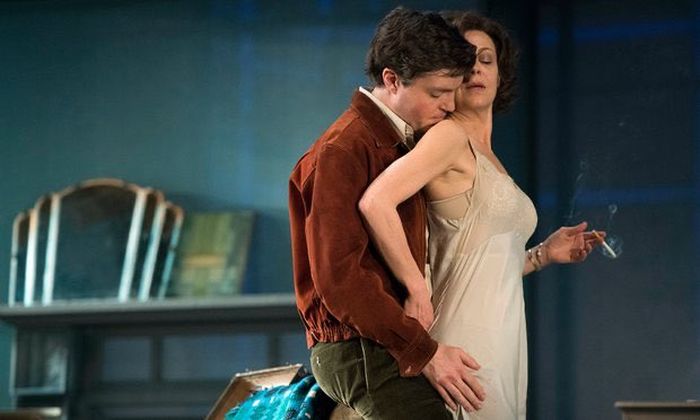Finding self-love through the Rocky Horror Picture Show
Emma Robinson reminisces on her unconventional introduction to self-love, body positivity and sexual liberation.
Thirteen-years-old, typically antisocial and painfully self-conscious, I was the youngest audience member at The Rocky Horror Picture Show. It’s probably easiest to summarise the memorable experience of this Rock ‘n’ Roll cult classic by stating that its soundtrack includes gems like ‘Touch-a-Touch-a-Touch-a-Touch Me’ and ‘Sweet Transvestite’. It was definitely like nothing I’d ever seen before.
Perhaps being introduced to sexuality through raucous, fun theatre is unconventional. Perhaps it’s easier for a prudish English family than the direct conversation. It was a tactic that my parents continued, when, at almost 15, sitting front row at The Full Monty, I was whacked by the stray arm of the screaming woman behind me as she stretched for the shirt from the striptease.
“Theatre creates memories and emotions that stay with us and alter us, long after the catchy songs have left our head.”
Like most people, in Biology I learnt the basics, which barely teach you enough to understand your own body. Certainly, the word ‘orgasm’ was never uttered in the classroom, unless someone purposefully mispronounced ‘organism’ – setting off a Mexican wave of sniggers. So, whilst watching actors disappear beneath a shaking duvet on a vertically propped-up bed is more reminiscent of something you’d see in The Sims than real life, at least Rocky Horror depicted sexual enjoyment and fulfilment. Undoubtedly, its content is in due need of some amendments. It doesn’t address, and even humourizes, the very serious issue of sexual manipulation and consent. However, the sexually liberated mansion of Dr Frank-N-Furter, which sweethearts Brad and Janet accidentally stumble upon and are dragged into, is empowering in its shameless promiscuity, bisexuality and queerness.
My most enduring memory is probably not the depiction of sexual encounters, but instead a more individual sexuality. I remember Frank, in his corset and garters, claiming the stage, with a sultry and slow dance, not merely proudly, but enticingly, singing that he’s just ‘a sweet transvestite from Transsexual, Transylvania’. Forget being spoon-fed self-acceptance through your grandparents’ compliments, that was shoving self-confidence in your face and daring you to look away. It was voyeuristic, but the audience were meant to be complicit.
“I thought how ridiculous this all was, how out of place I was, and then, how it just didn’t matter.”
Maybe we should ask whether it promotes universal self-acceptance to have a six-pack drawn onto the actor playing Rocky, and why a sexualised body must be so stereotypically ‘desirable’. However, with the lengths actors can go to with workout regimes, including restrictive diets and even dehydrating before takes in the mainstream film-industry, it can hardly be surprising. Arguably, by being so evidently fake – the actor only needed to turn sideways – Rocky Horror was parodying, not continuing, the issues of presenting different body shapes within the arts.
My memory of Rocky Horror goes far beyond the stage, the drawn-on six-packs and wigs that would probably now be a fire-hazard. What made this an experience, not a performance, was how the audience dressed-up in their favourite characters’ costumes. After the show, women and men, in their fishnet tights and strappy heels, strutted and scuttled under Birmingham’s bypass in a collective stampede. If alone, any one of them would have been likely subjected to bystanders erupting, like a Greek chorus, in a unified ‘walk of shame!’. But that evening, no-one was pointing, and the only laughter was purely joyous. No-one cared if their mascara had run or their hot-pants were too small or someone else wore the outfit better (and trust me, there were many repeats).
Among all these people, filtering out of the theatre, I remember seeing an old man, in his sweater-vest and brogues, with a huge, beaming smile. And I thought how ridiculous this all was, how out of place he and I were, and then, how it just didn’t matter.
Self-love, body-positivity, sexual liberation. These are all very complicated, personal terms and I’m not sure that any truly encompass what that night helped to teach me. But I do know that theatre has the potential to create memories and emotions that stay with us and alter us, long after we’ve finally managed to get the catchy songs out of our heads.
 Comment / Cambridge students are too opinionated 21 April 2025
Comment / Cambridge students are too opinionated 21 April 2025 News / Candidates clash over Chancellorship25 April 2025
News / Candidates clash over Chancellorship25 April 2025 News / Cambridge professor paid over $1 million for FBI intel since 199125 April 2025
News / Cambridge professor paid over $1 million for FBI intel since 199125 April 2025 News / Zero students expelled for sexual misconduct in 2024 25 April 2025
News / Zero students expelled for sexual misconduct in 2024 25 April 2025 Comment / Does the AI revolution render coursework obsolete?23 April 2025
Comment / Does the AI revolution render coursework obsolete?23 April 2025






